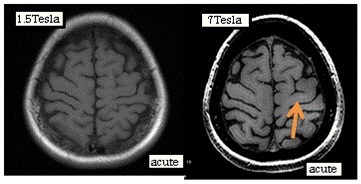Session Information
Title: Imaging of Rheumatic Diseases I: Imaging in Gout, Pediatric, Soft and Connective Tissue Diseases
Session Type: Abstract Submissions (ACR)
Background/Purpose: The cerebral microvascular lesions of patients with neuropsychiatric systemic lupus erythematosus (NPSLE) have not been fully elucidated. The 7Tesla MR scanner has high image resolution and can be expected to detect cerebral microvascular lesions that have never before been visible. We examined the cerebral microvascular lesions of NPSLE using a 7Tesla MR scanner.
Methods: We studied 7 acute phase-NPSLE patient and 11 non-NPSLE. MRI was performed using a 1.5Tesla MR scanner and 7Tesla MR scanner (T1-weighted imaging, T2-weighted imaging, diffusion-weighted imaging, magnetic resonance angiography). Two radiologists performed the interpretation without clinical information. Diagnosis of was determined by a neurologist, psychiatrist and rheumatologist.
Results: Examination by the 7Tesla MRI revealed cerebral microvascular lesions(under 100 micrometer) in 6 of 7 NPSLE patient. These findings were not detected in any of the patients with non-NP SLE. These findings were not detected by 1.5 Tesla MRI. There were not findings at all in 1.5TeslaMRI, and the case that included findings was found in only 7TeslaMRI. The cerebral microvascular lesions were found around the central sulcus especially in T2-weighted image. These MRI findings disappeared after central nervous symptom improvement in two of the three NPSLE patient that reexamined three months later. However, we did not find a direct association between the MRI findings and the neuropsychology dysfunction.
Image:41 years old female She had both legs motor nerve disorder.
The cerebral microvascular lesions were found around the central sulcus in T2-weighted image. It could be find only by using 7TeslaMRI.
Conclusion: Cerebral microvascular lesions could be detected in patients with NPSLE by 7 Tesla MRI, suggesting that 7 Tesla MRI is a useful tool for diagnosing the cerebral lesions of NPSLE. It will be necessary to elucidate the association between cerebral microvascular lesions and neuropsychological dysfunction.
Disclosure:
N. Sasaki,
JSPS KAKENHI ,
2;
O. Murata,
None;
Y. Ninomiya,
None;
Y. Oikawa,
None;
H. Kobayashi,
None;
K. Yamauchi,
None;
M. Sasaki,
None;
T. Sawai,
None;
Y. Nakamura,
None.
« Back to 2013 ACR/ARHP Annual Meeting
ACR Meeting Abstracts - https://acrabstracts.org/abstract/detection-of-cerebral-microvascular-lesions-in-patients-with-acute-phase-neuropsychiatric-systemic-lupus-erythematosus-by-7tesla-mri/

